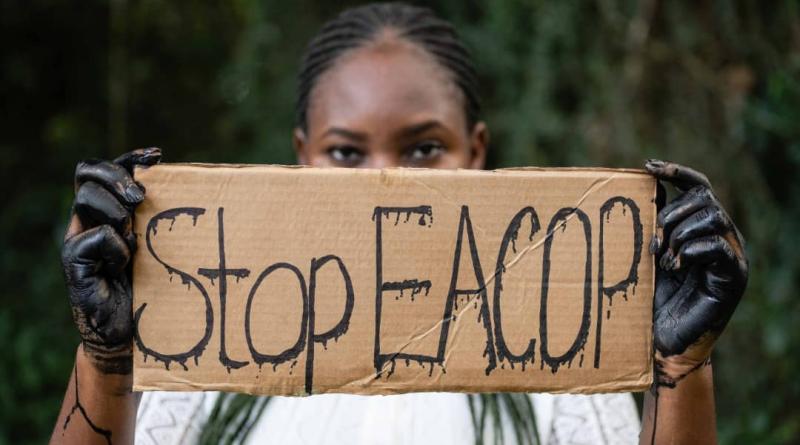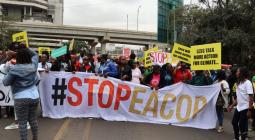StopEACOP Campaign wins People Power Award at Copenhagen Conference

Africa - The StopEACOP campaign was announced as one of the winners of the inaugural People Power Award at the conclusion of the two-day Copenhagen People Power Conference hosted by ActionAid Denmark.
The conference brought together over 200 activists, advocates, and experts to discuss strategies for advancing climate justice, human rights, and peace through grassroots social movements. Sessions focused on supporting frontline communities, movement lifecycles, digital threats, inclusive climate action and more.
The StopEACOP campaign, which aims to stop the construction of the East African Crude Oil Pipeline (EACOP) in Uganda and Tanzania, was recognized for its locally-led organizing in the face of intimidation and violence from the host governments. The recognition was also the result of globally coordinated days of action against project proponents that have seen banks and insurance firms pull out. By spotlighting community voices, the campaign has built an inclusive climate movement opposing the pipeline as incompatible with climate goals and human rights.
Speakers from the StopEACOP campaign thanked ActionAid Denmark and conference organizers for the platform to connect with diverse movements.
Zaki Mamdoo, StopEACOP Campaign Coordinator said,
“We welcome this award and the recognition it brings to a just and worthy struggle against extraction, dispossession, exploitation and harm. It serves as a timely reminder for us to celebrate our victories and each other as we continue to build a movement that is capable of achieving our shared aspirations for a sustainable, free and prosperous future,"
Diana Nabiruma, Senior Communications Officer, AFIEG0
"As we celebrate this honor, we reiterate our condemnation of any Chinese funding for the EACOP pipeline. This award recognizes people power, not profit-driven destruction. China claims to champion developing nations, but financing EACOP harms communities while fueling the climate crisis. We hope China chooses solidarity with vulnerable communities over complicity with fossil fuel interests.”
Samuel Okulony, Director, Environment Governance Institute - Uganda said,
“This recognition signifies a resounding victory for the dedicated individuals who have tirelessly opposed the EACOP and its profound adverse effects on people, nature, and our climate. Winning this award underscores the strength of collective action, the amplification of our voices when united, and our firm belief that change is possible when we reject the status quo. Let this accolade serve as a beacon of hope and a rallying cry for us all. Together, we possess the capacity to forge a more sustainable, equitable, and just future for our planet and all its inhabitants”
Charity Migwi, Regional Campaigner, 350Africa.org said,
“The strides made by the StopEACOP campaign thus far are a testament to the strength that lies in communities uniting against injustice. Sustained local resistance to the EACOP project and global solidarity with the campaign have seen 27 commercial banks and 23 (re)insurers so far rule out support for the harmful project. As we celebrate this award, we reiterate calls for a stop to the flow of finance to this project, which affects the wellbeing of communities and poses a danger to biodiversity and the climate. We urge financial institutions that are yet to distance themselves from EACOP, to do so and for financing to be channeled to safe and sustainable renewable energy solutions.”
Rieke Butijn, Climate campaigner and researcher, BankTrack said,
“This award is a tremendous recognition of the impact of the #StopEACOP campaign so far. The rejection of this disastrous pipeline by almost the entire commercial banking sector is testament to both the tenacity of this campaign and the international #StopEACOP community we’ve built over the years and the obvious financial risks of the project. Chinese financiers considering pumping money into the EACOP should recognise these risks and heed the call of African civil society to invest in a genuine just transition, and not in harmful new fossil fuel infrastructure.”





